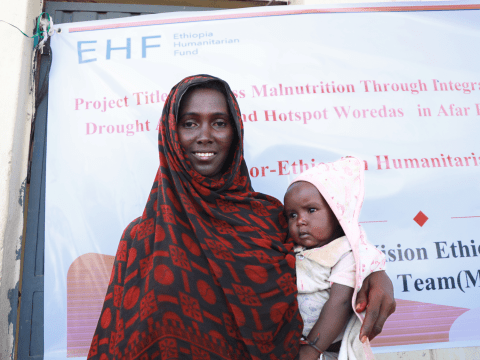Health on the Move

Six-month-old Mohammed had been fussy and crying all morning. His mother, Wesekmeli, quickly noticed the change in his behaviour. Concerned, she grabbed Mohammed and headed to the Mobile Health and Nutrition Team (MHNT), providing services near her home in Bidu district, Afar region. Within just a few hours, the health professionals identified what was wrong with Mohammed, provided the necessary medicines, and reassured Wesekmeli that he would feel so much better once he started taking the medicines. She returned home not only relieved about Mohammed’s health but also prepared to care for her two other children. "Seeing my boy cry like that, I was so worried, and I didn’t know what to do. But the health team helped us so quickly, and I was relieved," said Wesekmeli.
 In the past, however, things were far from easy. One of the biggest challenges for Wesekmeli and her community was the unavailability of healthcare providers nearby. Recalling those struggles, Wesekmeli said, “My village is far from the city, and there were no health facilities nearby. Whenever my children fell ill, I had to take them to the next village, which is over an hour's drive from my house.” Since transportation services were not available, she and others in the community used to stand by the roadside, begging passersby to give them a ride. Sometimes, when no one is willing to help, the villagers would block the road, stopping vehicles until someone transported the sick to the nearest health facility.
In the past, however, things were far from easy. One of the biggest challenges for Wesekmeli and her community was the unavailability of healthcare providers nearby. Recalling those struggles, Wesekmeli said, “My village is far from the city, and there were no health facilities nearby. Whenever my children fell ill, I had to take them to the next village, which is over an hour's drive from my house.” Since transportation services were not available, she and others in the community used to stand by the roadside, begging passersby to give them a ride. Sometimes, when no one is willing to help, the villagers would block the road, stopping vehicles until someone transported the sick to the nearest health facility.
These circumstances were worsened by the recurring drought in Ethiopia, putting the already vulnerable community at further risk of contracting various diseases. Over the past several years, Ethiopia has been affected by recurring droughts, increasing in both duration and frequency. Caused by five consecutive failed rainy seasons, the prolonged (late-2020-2023) drought was considered the most severe the country has seen in 40 years, leaving an estimated 17 million people in need of humanitarian assistance in 2023. The impact of the drought, such as food insecurity, water shortages and malnutrition, caused multiple health outbreaks in the Bidu district.
Today, however, things have improved significantly. With the arrival of World Vision Ethiopia’s Mobile Health and Nutrition Team, lifesaving healthcare services are brought directly to the community. This team not only treats malnourished children and sick individuals but also provides vaccinations, deworming, and treatment for common illnesses like diarrhoea. They educate parents on how to prevent diseases, maintain proper nutrition, and practice good hygiene. The team also holds community sessions on breastfeeding, complementary feeding, and managing illnesses at home, while referring severe cases to nearby health facilities for advanced care.

Thanks to the drought response project funded by the Ethiopia Humanitarian Fund (EHF) and implemented by World Vision, the mobile team has eliminated the need for long and exhausting trips in search of healthcare, making treatment accessible and timely for Wesekmeli’s community. The early detection and treatment of malnutrition and different illnesses have significantly helped over 14,000 children, mothers, and elderly people become healthier and safer.
Wesekmeli expressed her gratitude, saying that she is very thankful for the support from the team. “Apart from treating us and our children, we have also learnt how to take care of them. Now I know how to properly breastfeed Mohammed and what kind of food I should prepare for my older children. This has made a big difference in our lives,” she said.
By Bethel Shiferaw, Communication Coordinator (HEA), World Vision Ethiopia